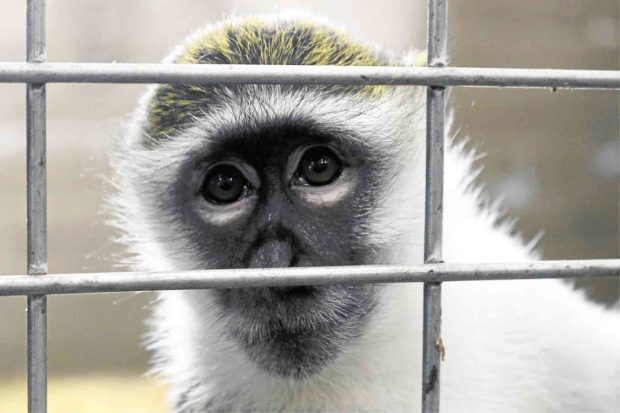Even lab monkeys need retirement funds

AFTER THE TESTS, A LIFE AT REST Bella, a velvet monkey, looks out of a cage at Primates Inc., a 7-hectare sanctuary in Westfield, Wisconsin, where research monkeys like her live in retirement for the rest of their years after serving humans. —AP
WESTFIELD, Wisconsin — Izzle, Timon, Batman, River and Mars spent years confined inside a lab, their lives devoted to being tested for the benefit of human health.
But these rhesus macaques have paid their dues and are now living in retirement—in larger enclosures that let them venture outside, eat lettuce and carrots, dip their fingers in colorful plastic pools, paint and hang from pipes and tires—in relative quiet.
More research labs are retiring primates to sanctuaries like Primates Inc., a 7-hectare rural compound in central Wisconsin, where they can live their remaining years. For some monkeys, it’s their first time hanging out in the fresh air.
“Just to see them look around in amazement. You know it was all very calm and peaceful,” said Amy Kerwin, who worked for 15 years to get the Westfield, Wisconsin, sanctuary off the ground after being employed in a University of Wisconsin research lab.
There were approximately 110,000 primates in research facilities in 2017, according to the most recent data available from the US Department of Agriculture.
While most research facilities need primates to be euthanized to examine their tissues, technological advances, such as brain scans, mean fewer monkeys need to be put down. Plus, researchers who become close with the animals are making more efforts to give the ones who can survive a retirement, rather than euthanization.
Students set up foundation
In 2015, a group of researchers, graduate students and an ethicist created the Research Animal Retirement Foundation. It raises funds for labs to pay the sanctuaries to retire them. So far they have given $33,000 in funding for three monkeys who went to the Wisconsin sanctuary.
A House bill introduced last month requires federal agencies to develop a policy allowing animals no longer needed for research to be adopted out or put in sanctuaries. Currently, no federal regulations dictate what happens to them. Some are sold to other studies when one study is done.
Currently, grants through the National Institutes of Health, which is the largest public funder of biomedical research in the world, don’t include money for retirement. That leaves the labs and sanctuaries to find the tens of thousands of dollars per monkey, per year needed to care for them.
Monkeys are finished with studies at different ages and some can live for decades. Some can also leave with lingering issues, like compulsive behaviors caused by boredom.
That’s why many sanctuaries require the labs to send some funding, often between $10,000 and $20,000, to help care and create space for monkeys. Since many of the primates have only lived in labs, they don’t have the skills needed to live in the wild.
They deserve it
Most primates in accredited sanctuaries are chimpanzees (which are no longer used in most research), capuchins and squirrel monkeys, according to Erika Fleury, program director for the North American Primate Sanctuary Alliance, an advocacy group for captive primates. They come from research, the entertainment industry or private homes.
“We really feel very grateful to them and we want them to have wonderful lives after,” said Cindy Buckmaster, chair of the Americans for Medical Progress, which represents research universities and medical research companies. “They certainly deserve it. But it has to be done well and it has to be done properly because we’re not going to put our animals in harm’s way.”
Some animal rights groups, including People for the Ethical Treatment of Animals, don’t support research but do agree with retiring monkeys to sanctuaries rather than having them euthanized. —AP